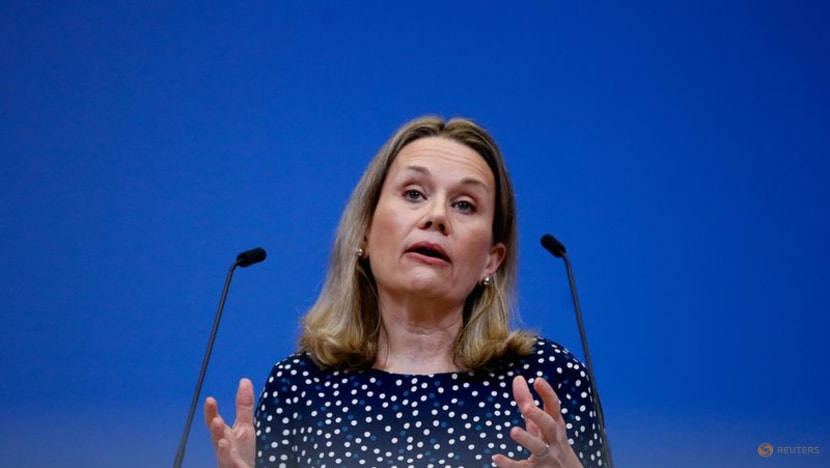NATO seeks to engage Indo-Pacific partners amid concerns about China as ‘systemic challenge’: US diplomat

FILE PHOTO: U.S. Ambassador to NATO Julianne Smith gestures during a news briefing on the eve of a meeting of alliance defence ministers, expected to focus on tensions between Russia and the West over Ukraine, in Brussels, Belgium, February 15, 2022. REUTERS/Johanna Geron
The North Atlantic Treaty Organization (NATO) is seeking deeper partnerships with countries in the Indo Pacific, as it addresses what it has called systemic challenges posed by China.
In line with that, NATO will include foreign ministers from Japan, New Zealand and Australia, as well as South Korea's deputy foreign minister, at its Meeting of NATO Ministers of Foreign Affairs on Tuesday (Apr 4).
NATO’s latest strategic concept listed China as one of its priorities for the first time last year, noted United States permanent representative to the alliance Julianne Smith.
“I think that signalled that allies are increasingly concerned about the PRC (People’s Republic of China) as a systemic challenge, as a country that is challenging the rules-based order,” she told CNA.
“And as such, the allies have been looking to strengthen their relationships with a variety of countries across the Indo Pacific.”
This comes as the alliance started tuning in to events in the Indo Pacific over the last two years, she added.
RELATIONS BETWEEN NATO AND INDO PACIFIC COUNTRIES
The four countries have been developing individual partnerships with NATO, she said, adding that each nation can shape its partnership with the alliance in any way it sees fit.
“Primarily, we've been focusing with these countries on how we can share best practices and unique insights on the hybrid tactics that countries like the PRC and Russia increasingly rely on,” she said.
NATO included the four countries in a ministerial meeting for the first time last year.
“We find it incredibly helpful and informative and productive to have our Indo-Pacific partners join us for meetings here at NATO headquarters, to talk about things like threats to critical infrastructure or how to build resilience or how to defend against cyber attacks,” she added.
WHAT WAR IN UKRAINE SHOWS
On what the Ukraine war shows Indo-Pacific countries concerned about a China that is perceived to be increasingly aggressive, Ms Smith highlighted the international support for Ukraine.
Noting that more than 50 countries are currently providing security assistance, and many more are providing humanitarian and economic aid in Ukraine’s fight against Russia, she said the support sends “a very strong signal” to other countries that may someday entertain the possibility of violating another state's sovereignty.
“Some of the countries that we watch very closely, such as the PRC, but also Iran, are taking note of what's happening in Ukraine. And not only taking note of what's happening on the ground, but they're taking note of the global support that's been on full display to stand behind Ukraine,” she said.
The support is not only for the Ukrainians’ fight to defend their territory but also in terms of voting to condemn Russia's aggression in the United Nations, she noted.
“I think all of that sends a very, very strong signal to the PRC in particular,” she added.














